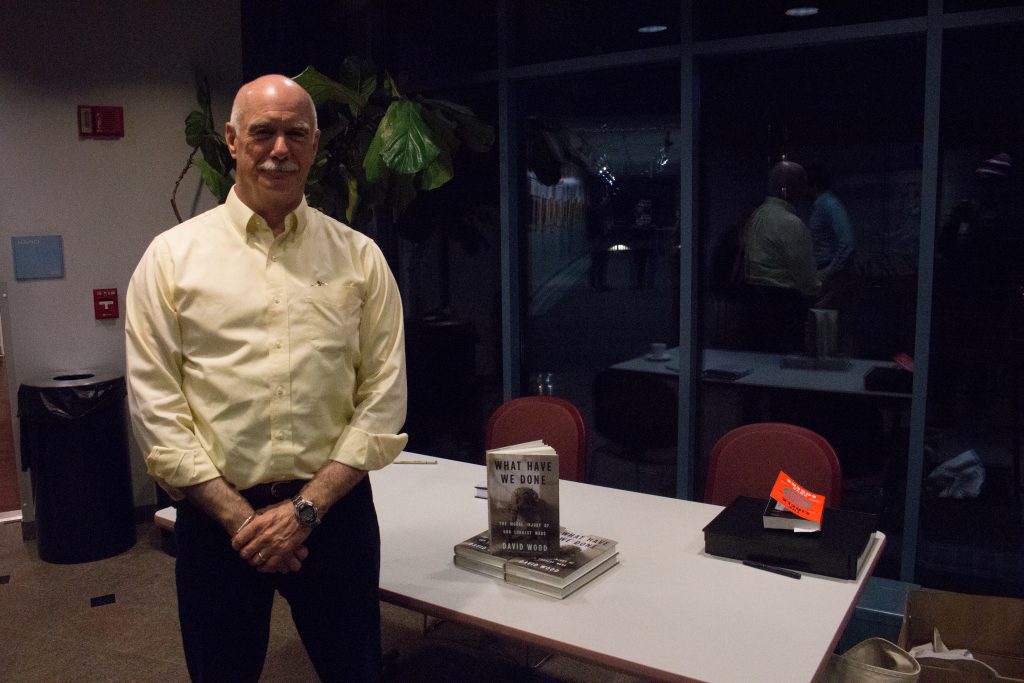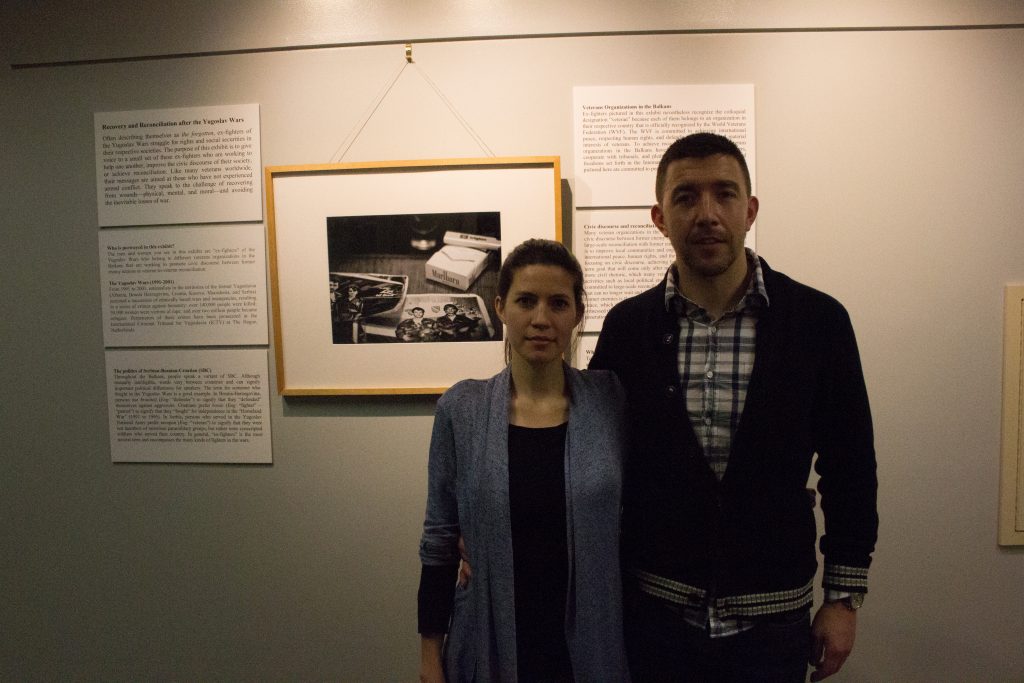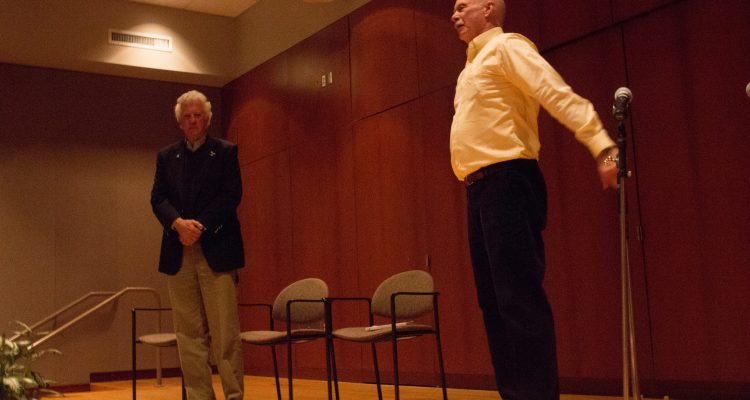STORRS – During a Monday night guest lecture at the University of Connecticut’s Thomas J. Dodd Research Center, Pulitzer-prize winning war correspondent David Wood and decorated veteran Joseph Brett told personal stories while emphasizing moral injury as the most compelling issue facing combat veterans.
“Moral injury is a violation of your sense of right and wrong,” Wood said. “In war, you can’t live up to those values. Your sense of what’s right is constantly being bombarded and, in some cases, damaged.”
Brett, who served during Vietnam, said he suffered a major emotional wound when a soldier named Forrest Hollifield died in his place.
One morning, Brett was supposed to accompany a pilot during a flight when he opted out and Hollifield subsequently replaced him.
The pilot ended up crashing, killing both passengers.
“I thought they were asleep, but they were dead,” Brett said. “I was shocked. The only victory was that my poor, sweet mom wouldn’t get a telegram.”
Wood recalled an incident in Afghanistan where a 22-year-old Marine named Nick Rudolph shot and killed a 10-year-old boy who was firing an AK-47 rifle at his fellow soldiers. Wood said that situations like these were common occurrences that caused deep moral wounds for veterans.
He said that the military must address this dilemma by better informing soldiers beforehand of the possibilities for such trauma.
“It’s an uphill battle to get the military to talk about killing,” Wood said. “No one sits down and talks about what may happen.”
Upon returning home from Vietnam at age 24, Brett said he initially drank, partied and could not find comfort anywhere; however, he eventually sought help through Alcoholics Anonymous and found spirituality as a source of guidance.
Over the next two years, Brett obtained a master’s degree in public administration from the John F. Kennedy School of Government at Harvard University and also traveled in the former Soviet Union, where he said he bonded with fellow veterans.
“Soviet military guys… they sounded like Vietnam veterans. Their humor was the same as our humor,” he said. “They got beat in Afghanistan, we got beat in Vietnam.”
Brett said that, despite these positive experiences, his moral injury from the war still haunted him constantly, prompting him to see a counselor in order to self-reconcile.
“It was quite an emotional experience… This thing was lifted. I’d somehow forgiven myself,” Brett said. “I finally overcame this injury that I never really knew I had or could’ve grasped.
Hollifield’s parents eventually started a memorial scholarship to honor their late son through Wake Forest University’s Sigma Chi fraternity.
Brett traveled to Wake Forest in order to eulogize his deceased comrade and share his story with the fraternity members.
At the end of the eulogy, Brett said he collapsed due to a buildup of emotions.
“It was a very profound experience, and what I found was this: I had to embrace this,” he said. “I couldn’t run. I spent my life running not knowing why, and I had to stop and face the death of Forrest Hollifield.”
Wood said that the most important lesson he learned in 35 years of covering conflicts is how highly the military values camaraderie and an unconditional responsibility for peers.
Failing to uphold this responsibility, he said, can negatively impact soldiers in a severe way.
“It’s one reason I think why so many veterans come home from war and they can’t really talk about what happened,” he said. “People don’t get that.”
A dangerous setup for sorrow, Wood added, is love.
“The amount of grief that happens is incalculable,” he said. “Part of what we’re talking about is coming to terms with the grief and sorrow from losing the people you loved most in the world.”
His new book, “What Have We Done: The Moral Injury of Our Longest Wars,” is based on his reporting in Iraq and Afghanistan and on veterans after they return. In the book, Wood explores how veterans’ exemplary acts of courage often turn into self-doubt and confusion after war, causing them to question their humanity.

“What We Have Done: The Moral Injury of Our Longest Wars” is David Wood’s second book. Wood stands next to print copies of his book in the Thomas J. Dodd Research Center | Photo: Isaiah Chisolm
Wood said that moral injury is different from and, in his experience, more common than post-traumatic stress disorder.
The latter, he said, is when everyday occurrences trigger involuntary “fight or flight” reactions in inappropriate situations, whereas the former mainly involves thoughts of regret or guilt related to a traumatic experience.
The reason for the book’s title, he said, is that we as a country have a moral agency.
“We have a role to play here,” Wood said. “We send people to war, morally injurious things happen… we need to welcome veterans and accept them.”
Jordan Kiper, a UConn graduate student who conducted research on the moral wounds and legacies of veterans from the Yugoslav Wars, brought in Wood and Brett as guest speakers at the Dodd Center.
Kiper, who’s pursuing a doctorate in anthropology, worked with his wife and photographer Robin Albarano to put together two adjacent exhibits relating to topics from the guest lectures: “A Legacy of Veteran Expressions After War” and “Recovery and Reconciliation After the Yugoslav Wars.”
Kiper and Albarano spent 18 months traveling through Serbia, Bosnia-Herzegovina and Croatia, interviewing around 200 ex-fighters and survivors from the Yugoslav Wars and surveying more than 700. He said that being with his wife aided the project.

Jordan Kiper (Right) and Robin Albarano (Left) alongside their exhibit “Recovery and Reconciliation After the Yugoslav Wars” in the Thomas J. Dodd Research Center. The exhibit will be on display until March 14. | Photo: Isaiah Chisolm
“I gained trust, over time, and then they learned to trust Robin as well,” Kiper said. “When we sat down for interviews, sometimes it was more like friends just being able to talk.”
The two exhibits will remain on display until February 28 and March 14, respectively.
Brett and Kiper are now in the process of organizing an event in Europe to bring together approximately 1,000 former Yugoslavian soldiers across multiple veterans organizations in Balkan countries. Kiper said that more precise details are not yet available.
For everyday people who wish to help veterans, Wood suggested that they familiarize themselves with them and ask them to tell their stories.
Brett said he wants veterans to be able to address their moral injuries sooner after combat ends so that they can lead happier post-war lives.
“We’re so lucky to be alive. We have to honor the people who died,” he said. “I’m a big fan of David and what he’s done.”
Correction: Jordan Kiper has interviewed around 200 ex-fighters and survivors of the Yugoslav Wars. An earlier version stated that he had interviewed around 200 veterans.


